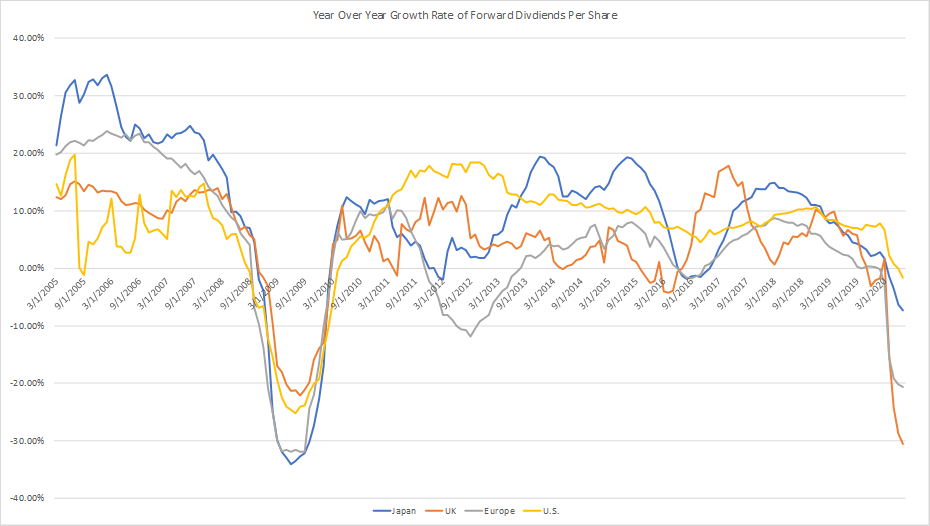Is Japan an alternative source for dividend income?
The coronavirus pandemic has had a significant impact on UK dividends, leading to reductions of more than £22bn. We explore why Japan may be the alternative source for dividend income.
This year, as global financial markets saw record levels of volatility, the disruption in the market was also felt across the UK dividend space. During Q2 2020, it experienced the biggest quarterly fall on record. As the coronavirus pandemic forced companies to shore up their balance sheets, UK dividend income significantly dropped by £22bn. Some estimates suggest that almost 60% of dividends were wiped out, compared to the same period in 2019.1Extraordinary dividend cuts across UK companies
In the UK, 176 companies cancelled dividend payouts, while a further 30 have been reduced, as boardrooms reacted to the pandemic engulfing the global economy.2 These extraordinary cuts were more severe than the reductions experienced during the global financial crisis.
Traditionally, many of the sectors favoured by pension funds and retail investors alike suffered. The oil, gas and energy sectors were hit hard. with some of the dividend-paying stalwarts, such as Shell, cutting their dividends for the first time since World War II. The banking sector suffered as well, due to regulatory pressure to cut dividends, with notable casualties such as HSBC and Lloyds reducing payments. In total, there were almost £8bn of dividends cut across the banking sector.3
The Investment Association has suspended the equity income yield requirements for 12 months, highlighting the problems that many funds in the equity income sector will face as these underlying cuts feed through. Investors have already started to pull money out of UK Equity Income funds, and it is evident that these same investors will be wondering where to look to replace them.
The following chart shows the sharp drop in forward dividends per share in the UK.
Click to enlarge

Source: Data Stream, 31 July 2020.
Is Japan the key to sustainable dividend income?
On the face of it, Japanese equities seem to offer a reliable and stable alternative source for dividend income. Foreign share ownership continues to improve, approaching nearly 30%. Share buybacks reached an all-time high (Y6.3 trillion) in 20194, a little lower than the previous year, but perhaps reflecting a cautious approach to liquidity, suggesting that Japanese companies seem to be prioritising dividends in their approach to shareholder returns. The share prices of Japanese companies have been hit hard but the security of their dividends remains stable. Furthermore, 50% of Japanese companies are net-cash-positive, have strong balance sheets and a focus on return on investment.5 This commitment from senior management should mean that these pay outs remain stable.
As I write this, the Japanese reporting season is in full swing and about 80% of listed companies have reported. Despite some companies planning to cut their dividends, it appears that regardless of a difficult period, approximately 60% plan to leave them unchanged, when compared with the same period last year.6
The bottom line
Despite dividends being under extreme pressure, this situation could be short-lived. However, in order to avoid concentration risk, diversifying the source of these dividends would seem prudent. As we have observed in the chart above, the UK and Europe have seen a greater fall in dividends per share, compared to Japan.
As Japan’s longest standing Prime Minister, Shinzo Abe, steps down, his successor will need to continue the changes and developments already made to corporate companies in Japan. We believe that the region could well be a viable new source of sustainable dividends for those looking to allocate away from the reduced dividend income environment in the UK or Europe.
Any opinion expressed is that of Russell Investments, is not a statement of fact, is subject to change and does not constitute investment advice.
1 Source: Q2 2020 UK Dividend Monitor Report
2 Source: Q2 2020 UK Dividend Monitor Report
3 Source: Q2 2020 UK Dividend Monitor Report
4 Source: Nissay Asset Management Report: https://www.nam.co.jp/english/news/pepdf/200207_report.pdf
5 Investment Week: https://www.investmentweek.co.uk/feature/4014642/benefiting-japan-corporate-culture-amid-bleak-macro-picture
6 Mitsubishi UFJ Morgan Stanley, Corporate Earnings Results Data, 11 August 2020.